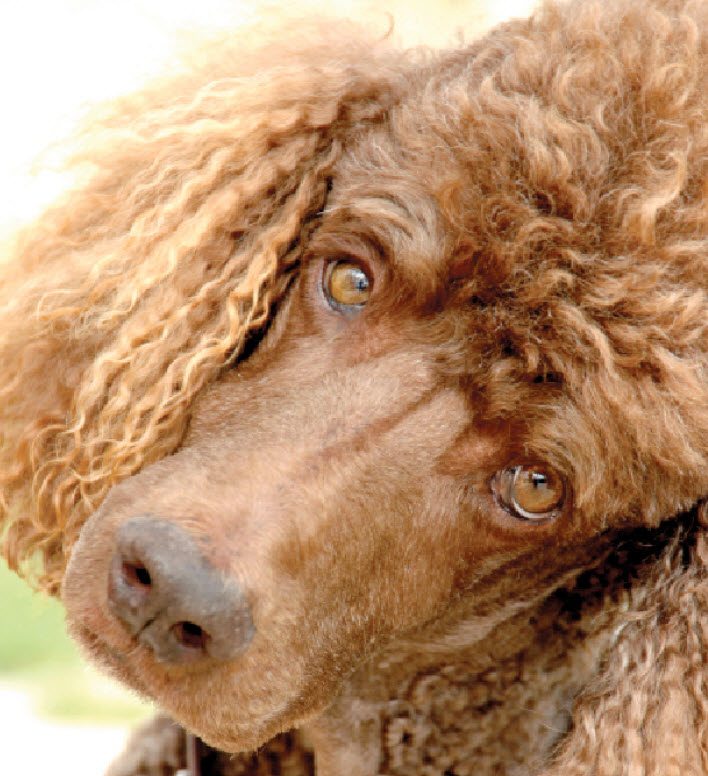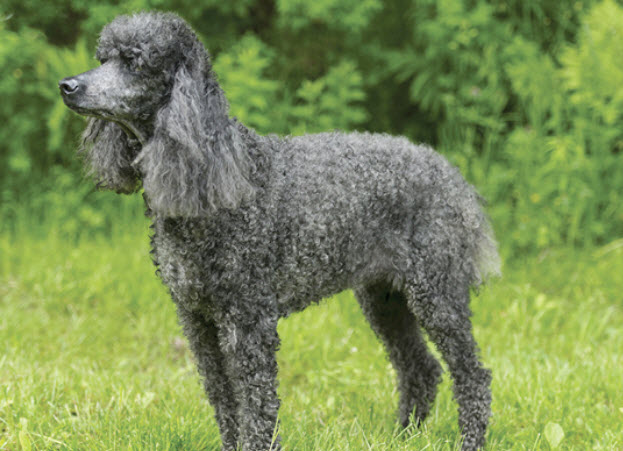
Not Just "Standard"
The Standard Poodle may be a "fancy" breed, but these dogs can have a great place in everyday families. They're considered:
- Energetic, active, and athletic
- Hypoallergenic coat sheds very little
- Above-average in intelligence and trainability when positive reinforcement training methods are used
- Quirky, entertaining personality
- People-oriented and eager to please
- Good with children and other pets
Those "fancy" needs can include:
- Needs a lot of exercise and mental stimulation
- Can be rambunctious and rowdy, especially as a younger dog
- Sensitive by nature, a bit slow to mature
- Has a tendency to bark quite a bit if not trained out of this habit
- Prone to boredom and separation anxiety, with associated chewing and howling behaviors
- Coat requires regular grooming
 Smart as a whip and full of fun, the Standard Poodle can easily become your best friend. She is a joyful and clever companion that enjoys being the center of attention.
Smart as a whip and full of fun, the Standard Poodle can easily become your best friend. She is a joyful and clever companion that enjoys being the center of attention.
The Standard Poodle is one of three Poodle varieties, all of which share the same breed standard and differ only in size. Poodles originated in Germany and were bred to hunt waterfowl. The characteristic “Poodle Clip” was developed by hunters to help the dogs swim more efficiently while leaving hair only over the joints to protect them from the cold. Poodles are quick to learn and have comical personalities; the Standard Poodle tends to be calmer than the two smaller varieties. Standard Poodles are obedient, lively, and loyal family companions. The Standard Poodle is a generally healthy breed with an average lifespan of 12-15 years.
Your Standard Poodle's Health
We know that because you care so much about your dog, you want to take good care of her. That is why we have summarized the health concerns we will be discussing with you over the life of your Poodle. By knowing about health concerns specific to Standard Poodles, we can tailor a preventive health plan to watch for and hopefully prevent some predictable risks.
Many diseases and health conditions are genetic, meaning they are related to your pet’s breed. There is a general consensus among canine genetic researchers and veterinary practitioners that the conditions we’ve described herein have a significant rate of incidence and/or impact in this breed. That does not mean your dog will have these problems; it just means that she is more at risk than other dogs. We will describe the most common issues seen in Standard Poodles to give you an idea of what may come up in her future. Of course, we can’t cover every possibility here, so always check with us if you notice any unusual signs or symptoms.
This guide contains general health information important to all canines as well as the most important genetic predispositions for Standard Poodles. This information helps you and us together plan for your pet’s unique medical needs. At the end of the article, we have also included a description of what you can do at home to keep your Poodle looking and feeling her best. You will know what to watch for, and we will all feel better knowing that we’re taking the best possible care of your pal.
General Health Information for your Standard Poodle
Dental Disease
Dental disease is the most common chronic problem in pets, affecting 80% of all dogs by age two. Unfortunately, your Standard Poodle is more likely than other dogs to have problems with her teeth. Dental disease starts with tartar build-up on the teeth and progresses to infection of the gums and roots of the teeth. If we don’t prevent or treat dental disease, your buddy may lose her teeth and be in danger of damage to her kidneys, liver, heart, and joints. In fact, your Poodle's life span may even be cut short by one to three years! We’ll clean your dog’s teeth regularly and let you know what you can do at home to keep those pearly whites clean.
 Infections
Infections
Standard Poodles are susceptible to bacterial and viral infections — the same ones that all dogs can get — such as parvo, rabies, and distemper. Many of these infections are preventable through vaccination, which we will recommend based on her age, the diseases we see in our area, and other factors.
Obesity
Obesity can be a significant health problem in Standard Poodles. It is a serious disease that may cause or worsen joint problems, metabolic and digestive disorders, back pain, and heart disease. Though it’s tempting to give your pal food when she looks at you with those soulful eyes, you can “love her to death” with leftover people food and doggie treats. Instead, give her a hug, brush her fur or teeth, play a game with her, or perhaps take her for a walk. She’ll feel better, and so will you!
Parasites
All kinds of worms and bugs can invade your Poodle's body, inside and out. Everything from fleas and ticks to ear mites can infest her skin and ears. Hookworms, roundworms, heartworms, and whipworms can get into her system in a number of ways: drinking unclean water, walking on contaminated soil, or being bitten by an infected mosquito. Some of these parasites can be transmitted to you or a family member and are a serious concern for everyone. For your canine friend, these parasites can cause pain, discomfort, and even death, so it’s important that we test for them on a regular basis. We’ll also recommend preventive medication as necessary to keep her healthy.
Spay or Neuter
One of the best things you can do for your Poodle is to have her spayed (neutered for males). In females, this means we surgically remove the ovaries and usually the uterus, and in males, it means we surgically remove the testicles. Spaying or neutering decreases the likelihood of certain types of cancers and eliminates the possibility of your pet becoming pregnant or fathering unwanted puppies. Performing this surgery also gives us a chance, while your pet is under anesthesia, to identify and address some of the diseases your dog is likely to develop. For example, if your pet needs hip X-rays or a puppy tooth extracted, this would be a good time–it’s more convenient for you and easier on your friend too. Routine blood testing prior to surgery also helps us to identify and take precautions against common problems that increase anesthetic or surgical risk. Don’t worry; we’ll discuss the specific problems we will be looking for when the time arrives.
Genetic Predispositions for Standard Poodles
 Bloat
Bloat
Gastric dilatation volvulus, also known as GDV or bloat, usually occurs in dogs with deep, narrow chests. This means your Poodle is more at risk than other breeds. When a dog bloats, the stomach twists on itself and fills with gas. The twisting cuts off the blood supply to the stomach and sometimes to the spleen. Left untreated, the disease is quickly fatal, sometimes in as little as half an hour. Your dog may retch or heave (but little or nothing comes up), act restless, have an enlarged abdomen, or lie in a prayer position (front feet down, rear end up). Preventive surgery in which the stomach is tacked down or sutured in place so that it is unlikely to twist is an option. If you see symptoms, take your pet to an emergency hospital immediately!
Heart Disease
Standard Poodles are especially prone to a life-threatening heart condition known as dilated cardiomyopathy, or DCM, in which the heart becomes so large, thin, and weak that it can no longer effectively pump blood to the body. As this problem advances, he may act weak or tired, faint or collapse, breathe in a labored way, or cough. We’ll conduct a yearly electrical heart screening (ECG) and/or an echocardiogram starting at age one to look for abnormal heart rhythms early. If found, we’ll treat this condition with medication and may also recommend dietary supplementation.
Eye Problems
Not many things have as dramatic an impact on your dog's quality of life as the proper functioning of his eyes. Unfortunately, Standard Poodles can inherit or develop a number of different eye conditions, some of which may cause blindness if not treated right away, and most of which can be extremely painful! We will evaluate his eyes at every examination to look for any signs for concern.
- Glaucoma, an eye condition that affects Standard Poodles and people too, is an extremely painful disease that rapidly leads to blindness if left untreated. Symptoms include squinting, watery eyes, bluing of the cornea (the clear front part of the eye), and redness in the whites of the eyes. Pain is rarely noticed by pet owners though it is frequently there and can be severe. People who have certain types of glaucoma often report it feels like being stabbed in the eye with an ice pick! Yikes! In advanced cases, the eye may look enlarged or swollen like it’s bulging. We’ll perform an annual glaucoma screening to diagnose and start treatment as early as possible. Glaucoma is a medical emergency. If you see symptoms, don’t wait to call us, go to an emergency clinic!
- Cataracts are a common cause of blindness in older Poodles. We’ll watch for the lenses of his eyes to become more opaque—meaning they look cloudy instead of clear—when we examine him. Many dogs adjust well to losing their vision and get along just fine. Surgery to remove cataracts and restore sight may also be an option.
Hypoadrenocorticism (Addison's)
Addison's Disease is an endocrine system disorder that occurs when the adrenal glands fail to produce enough hormones to keep the body functioning normally. Left untreated, hypoadrenocorticism can be fatal. Symptoms often mimic many other diseases, but we can run a specialized blood test to check for this specific condition. Though this disease can occur in any type of dog, Poodles are more at risk. We'll be watching for clinical signs at every exam and will periodically check his electrolyte levels to screen for this problem.
Hyperadrenocorticism (Cushing's)
Cushing's Disease is a malfunction of the adrenal glands that causes them to produce too much steroid hormone. This is a common problem in dogs, and your Poodle is more likely than other dogs to be affected. The condition usually develops slowly, and the early signs are easily missed. Symptoms include drinking and urinating more than normal, increased appetite, and reduced activity level followed later by a potbelly, thin skin, and hair loss. Treatment usually includes oral medications and requires close coordination with us to ensure correct dosing.
 Bleeding Disorders
Bleeding Disorders
There are several types of inherited bleeding disorders that occur in dogs. They range in severity from very mild to very severe. Many times a pet seems normal until a serious injury occurs or surgery is performed, and then severe bleeding can result. Standard Poodles are particularly prone to some relatively rare diseases of the blood.
- Hemolytic anemia and thrombocytopenia occur when the immune system goes haywire and starts attacking the pet’s own red blood cells or platelets. If the immune system destroys red blood cells, your dog quickly becomes anemic, weak, and lethargic. His gums will look whitish or yellow instead of a normal bright pink color. If the immune system destroys platelets, his blood won’t clot properly and he’ll have bruises or abnormal bleeding. We’ll perform diagnostic testing for blood clotting to check for these problems before we perform any surgeries. To slow or stop the immune system’s destruction of cells, we’ll prescribe steroids and other immune-suppressive drugs. Sometimes an emergency transfusion of red blood cells or platelets is needed.
- Von Willebrand’s disease is a blood clotting disorder frequently found in Standard Poodles. We’ll conduct diagnostic testing for blood clotting times or a specific DNA blood test for Von Willebrand’s disease and other similar disorders to check for this problem before we perform surgery.
Bone and Joint Problems
A number of different musculoskeletal problems have been reported in Standard Poodles. While it may seem overwhelming, each condition can be diagnosed and treated to prevent undue pain and suffering. With diligent observation at home and knowledge about the diseases that may affect your friend's bones, joints, or muscles, you will be able to take great care of him throughout his life.
- Sometimes your Poodle's kneecap (patella) may slip out of place. This is called patellar luxation. You might notice that your pet, while running, suddenly picks up a back leg or skips and hops for a few strides. He might then kick his leg out sideways to pop the kneecap back in place. These are common signs of patellar luxation. If the problem is mild and involves only one leg, your friend may not require much treatment beyond arthritis medication. When symptoms are severe, surgery may be needed to realign the kneecap to keep it from luxating further.
- Both hips and elbows are at risk for dysplasia, an inherited disease that causes the joints to develop improperly and results in arthritis. Stiffness in your Poodle's elbows or hips may become a problem for him, especially as he matures. You may notice that he begins to show lameness in his legs or has difficulty getting up from lying down. We can treat the arthritis—the sooner the better—to minimize discomfort and pain. We’ll take X-rays of your dog’s bones to identify issues as early as possible. Surgery is also sometimes a good option in severe and life-limiting cases. And keep in mind that overweight dogs may develop arthritis years earlier than those of normal weight, causing undue pain and suffering!
Epilepsy
There are three types of seizures in dogs: reactive, secondary, and primary. Reactive seizures are caused by the brain's reaction to a metabolic problem like low blood sugar, organ failure, or a toxin. Secondary seizures are the result of a brain tumor, stroke, or trauma. If no other cause can be found, the disease is called primary or idiopathic epilepsy. This problem is often an inherited condition, and Standard Poodles are commonly afflicted. If your friend is prone to seizures, episodes will usually begin between six months and three years of age. An initial diagnostic workup may help find the cause. Lifelong medication is usually necessary to help keep seizures under control with periodic blood testing required to monitor side effects and efficacy. If your dog has a seizure, carefully prevent him from injuring himself, but don't try to control his mouth or tongue. It won't help him, and he may bite you accidentally! Note the length of the seizure, and call us or an emergency hospital.
Diabetes
Diabetes mellitus is a fairly common disease in dogs. Any breed can be affected, but Poodles have an above average incidence. Dogs with diabetes are unable to regulate the metabolism of sugars in their bodies and require daily insulin injections. Diabetes is a serious condition and one that is important to diagnose and treat as early as possible. Symptoms include increased eating, drinking, and urination, along with weight loss. If he shows signs, we will conduct lab tests to determine if he has this condition and discuss treatment options with you. Treatment requires a serious commitment of time and resources. Well-regulated diabetic dogs today have the same life expectancy as other canines.
Allergies
In humans, allergies to pollen, mold, or dust make people sneeze. In dogs, rather than sneezing, allergies make their skin itchy. We call this skin allergy “atopy”, and Poodles often have it. The feet, belly, folds of the skin, and ears are most commonly affected. Symptoms typically start between the ages of one and three and can get worse every year. Licking the paws, rubbing the face, and frequent ear infections are the most common signs or allergies. The good news is that there are many treatment options available for these conditions.
Skin Conditions
Poodles are prone to a variety of skin problems, including sebaceous adenitis. You may notice that your dog has dry, scaly skin with patches of hair loss along the top of his head, back of the neck, and along his back. This condition typically develops when your dog is between one and five years of age. Treatment is generally long term, and we’ll likely try a combination of approaches to determine which is most effective with your dog. The response to treatment is highly variable, but you’ll almost always need to give fatty acid supplements and use special shampoos to remove dead skin and hair. The earlier the skin is checked out, the better the results.
Kidney Disease
Glomerulonephropathy is an inherited disease that slowly damages your Standard Poodle's kidneys, causing them to fail, often at an early age. Because damaged kidneys leak protein, we may be able to diagnose this disease by annually testing your pet’s urine for excessive protein. Early detection leads to a happier pet and an easier, more affordable treatment plan. We may also recommend a special diet as part of his therapy.
Cancer
Cancer is a leading cause of death in older dogs. Your Poodle will likely live longer than many other breeds and therefore is more prone to get cancer in his golden years. Many cancers are curable by surgical removal, and some types are treatable with chemotherapy. Early detection is critical! We’ll perform periodic diagnostic tests and look for lumps and bumps when we examine your pet.
Dental Abnormalities
Teeth abnormalities are often genetically induced and are relatively common in dogs, especially in purebred dogs like your Poodle. An overbite or underbite is called a malocclusion or a bad bite. Oligodontia is a condition in which only a few teeth are present. Misaligned teeth can also occur and cause lots of problems, but can usually be corrected with braces or extractions. (Yes, dogs can get braces!) We want to keep your buddy’s teeth healthy, so we will be watching his developing teeth closely.
Thyroid Problems
Poodles are prone to a common condition called hypothyroidism in which the body doesn’t make enough thyroid hormone. Signs can include dry skin and coat, hair loss, susceptibility to other skin diseases, weight gain, fearfulness, aggression, and other behavioral changes. We’ll conduct a blood test annually to screen for this disease. Treatment is usually as simple as replacement hormones given in the form of a pill.
Taking Care of Your Standard Poodle at Home
 Much of what you can do to keep your dog happy and healthy is common sense, just like it is for people. Watch her diet, make sure she gets plenty of exercise, regularly brush her teeth and coat, and call us or a pet emergency hospital when something seems unusual (see “What to Watch For” below). Be sure to adhere to the schedule of examinations and vaccinations that we recommend for her. This is when we’ll give her the necessary “check-ups” and test for diseases and conditions that are common in Poodles. Another very important step in caring for your pet is signing up for pet health insurance. There will certainly be medical tests and procedures she will need throughout her life and pet health insurance will help you cover those costs.
Much of what you can do to keep your dog happy and healthy is common sense, just like it is for people. Watch her diet, make sure she gets plenty of exercise, regularly brush her teeth and coat, and call us or a pet emergency hospital when something seems unusual (see “What to Watch For” below). Be sure to adhere to the schedule of examinations and vaccinations that we recommend for her. This is when we’ll give her the necessary “check-ups” and test for diseases and conditions that are common in Poodles. Another very important step in caring for your pet is signing up for pet health insurance. There will certainly be medical tests and procedures she will need throughout her life and pet health insurance will help you cover those costs.
Routine Care, Diet, and Exercise
Build her routine care into your schedule to help your Poodle live longer, stay healthier, and be happier during her lifetime. We cannot overemphasize the importance of a proper diet and exercise routine.
- Supervise your pet as you would a toddler. Keep doors closed, pick up after yourself, and block off rooms as necessary. This will keep her out of trouble and away from objects she shouldn’t put in her mouth.
- Regular brushing and grooming is needed to keep her coat beautiful.
- Standard Poodles often have serious problems with their teeth, so you’ll need to brush them at least three times a week!
- Clean her ears weekly, even as a puppy. Don’t worry—we’ll show you how!
- She's a smart dog with lots of energy, so keep her mind and body active, or she'll get bored. That's when the naughty stuff starts.
- She loves the water, and swimming is a great form of exercise for your Standard Poodle!
- She is an athletic dog that excels at dog sports like obedience, agility, and even hunting.
- Keep your dog’s diet consistent and don’t give her people food.
- Feed a high-quality diet appropriate for her age.
- Exercise your dog regularly, but don’t overdo it at first.
What to Watch For
Any abnormal symptom could be a sign of serious disease or it could just be a minor or temporary problem. The important thing is to be able to tell when to seek veterinary help and how urgently. Many diseases cause dogs to have a characteristic combination of symptoms, which together can be a clear signal that your Standard Poodle needs help.
Office Calls
Give us a call for an appointment if you notice any of these types of signs:
- Change in appetite or water consumption
- Tartar build-up, bad breath, red gums, or broken teeth
- Itchy skin (scratching, chewing, or licking); hair loss
- Lethargy, mental dullness, or excessive sleeping
- Fearfulness, aggression, or other behavioral changes
- Dull coat, hair loss; sluggish, weight gain
- Lumps or bumps – regardless of size
Emergencies
Seek medical care immediately if you notice any of these types of signs:
- Scratching or shaking the head, tender ears, or ear discharge
- Inability or straining to urinate; discolored urine
- Cloudiness, redness, itching, or any other abnormality involving the eyes
- Dry heaving or a large, tight, painful abdomen
- Fainting, collapse, breathing issues, coughing
- General listlessness, droopy facial expression, vomiting, diarrhea
- Drinks and urinates more, eats more; potbelly, poor haircoat
- Gums that are a color other than bright pink
- Any abnormal shaking, trembling, or excessive involuntary tremors
- Increased hunger and thirst, weight loss
- Leg stiffness; reluctance to rise, sit, use stairs, run, or jump; “bunny hopping”
